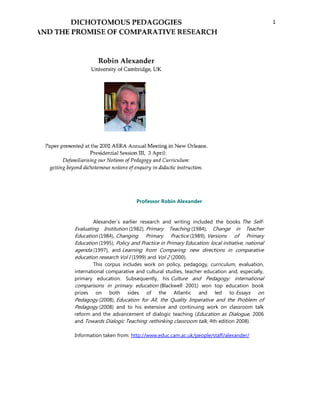
Rehash dichotomous pedagogy ii
- 1. 1 Professor Robin Alexander Alexander´s earlier research and writing included the books The Self- Evaluating Institution (1982), Primary Teaching (1984), Change in Teacher Education (1984), Changing Primary Practice (1989), Versions of Primary Education (1995), Policy and Practice in Primary Education: local initiative, national agenda (1997), and Learning from Comparing: new directions in comparative education research Vol I (1999) and Vol 2 (2000). This corpus includes work on policy, pedagogy, curriculum, evaluation, international comparative and cultural studies, teacher education and, especially, primary education. Subsequently, his Culture and Pedagogy: international comparisons in primary education (Blackwell 2001) won top education book prizes on both sides of the Atlantic and led to Essays on Pedagogy (2008), Education for All, the Quality Imperative and the Problem of Pedagogy (2008) and to his extensive and continuing work on classroom talk reform and the advancement of dialogic teaching (Education as Dialogue, 2006 and Towards Dialogic Teaching: rethinking classroom talk, 4th edition 2008). Information taken from: http://www.educ.cam.ac.uk/people/staff/alexander/
- 2. 2 Author´s goals Re-conceptualizing pedagogy and curriculum through criticizing how the teaching act has been atomized in factors to study the phenomenon from a causality approach (method X allow student to learn Y) and highlighting the failure of integrating once again such factors to as a coherent and recognizable events located in time and space. María: I would say he re-conceptualizes the relationship between pedagogy and teaching, rather than the curriculum. The curriculum could be seen as part of pedagogy or teaching, depending on the theoretical perspective. Problematizing the reductionism with which teaching has been conceived. Especially the proliferation of certain models as, for instance, script teaching and bipolar models of pedagogy. María: Yes, the author challenges the dichotomous thinking that is often applied to pedagogy and obscures the diverse combinations of pedagogical approaches that emerge in different contexts. Scripted teaching or scripted instruction refers to commercial reading programs that have highly structured lessons, often with specific time allotments for teaching specific skills, and often word-for-word scripts of what the teacher is to say. Scripted instruction has often been advocated for schools where teachers have had inadequate teacher training and is also seen as way to standardize the quality of instruction. Critics say that such programs stifle teachers' creativity, undermine teachers' expertise, and fail to provide for the diverse needs of many classrooms. Advocates see it as the easiest way to provide teachers with the essential elements of effective reading instruction. Scripted instruction has also been applied to preparation of lessons in many other subject matter areas. Retrieved from: http://en.wikipedia.org/wiki/Scripted_teaching Bipolar models of pedagogy… Examples of bipolar models: Student center vs. teacher center, or process vs. product Author’s claim Developing a science for teaching acts based on a comparative inquiry to incorporate political and conceptual spaces in re-conceptualizing curriculum and pedagogy. María: I am not sure if he wants to develop a science for teaching acts or if he wants to develop a new approach to studying pedagogy that contemplates the political and conceptual spaces you mention.
- 3. 3 Methodological approach Conceptualizing teaching based on a comparative model (5 countries –England, France, Russia, USA, and India-, and working hard against ethnocentrism (bias in favoring one culture/country) because terms are culturally and linguistically situated. IMPORTANT NOTE OF THE AUTHOR: Comparative inquiry is important, but there is a risk of using it to increase the bipolar models of pedagogy if the researchers do not control the ethnocentric perspective María: I think he is both conceptualizing teaching and uncovering conceptualizations of teaching in different contexts. Theoretical model Pedagogy encompasses that act together with purposes, values, ideas, assumptions, theories and beliefs, which inform, shape, and seek to justify it. María: the act of teaching? Teaching is cultural act, which means such act is a group of coherent and recognizable events that ensue in time and space, and also involves discourses (systems of values and ideas). Three levels of data analysis: state/school/classroom: María: I would add here that across these three levels of analysis he identifies 6 “versions of teaching”. He also states that these versions are on a continuum and not distinct “national descriptors”.
- 4. 4 Conclusion In integrating teaching acts (frame/form/act) and discourses of pedagogy (systems of values) emerges the complex relationship between theories and practices. Such relationship is not linear, because teaching practices embrace contradictory thinking and mixed messages: teaching can be traditional and progressive at the same time (bipolar pedagogy models are not useful). María: Yes, that is why the author stresses the need for pluralist frameworks to conceptualize teaching “and its informing values” Research implications The focus of research on teaching is not the effectiveness; instead, teaching acts should be conceived as complex relationships between mixed values and observable practices (Frame/ Form/ Act). María: He also emphasizes that values should be considered with the same seriousness as observable practices. According to Alexander, pedagogies manifest values and beliefs that are closely tied to culture and are complex.